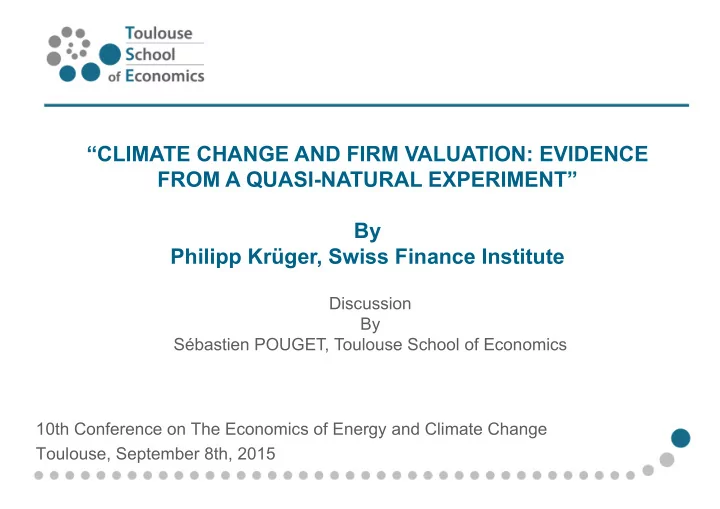

“CLIMATE CHANGE AND FIRM VALUATION: EVIDENCE FROM A QUASI-NATURAL EXPERIMENT” By Philipp Krüger, Swiss Finance Insti tute Discussion By Sébastien POUGET, Toulouse School of Economics 10th Conference on The Economics of Energy and Climate Change Toulouse, September 8th, 2015
The paper Research Question: How does mandatory disclosure of � greenhouse gas emissions impact firm value? Methodology: Quasi-experiment � The event: UK Companies Act that requires companies listed in the � Main Market of the London Stock Exchange (treated firms) to disclose their carbon emissions The control groups: firms that already disclosed, firms that are listed � on the AIM market, firms that are listed in other European markets Results: Corporate value increases after mandatory disclosure � is imposed, more so for industries that generate high levels of emissions
Questions on the results If disclosing CO2 emissions is good for shareholder value, why � did firms not disclose before voluntarily? Why does firm value increases after disclosure? � Better liquidity due to more information? Change in the shareholder � base? There could actually be negative strategic consequences for � corporations in particular for carbon-intensive industries. What happens to the stock price of the firms that already � disclosed their emission prior to the approval of the Ac There could be a negative reaction due to the loss of “prestige” or � “visibility” …
Questions on the methodology Are some treated firms already covered by some involuntarily � disclosure programs? AIM stock market might not have the same listing requirements � or liquidity as the Main Market => issues for the control sample? Is it really a natural-experiment? � Maybe the UK regulator chose to target the Main Market, because it � anticipated that it would be good for large firms’ valuation to disclose, but voluntarily left the AIM market outside the scope of the new regulation, because it anticipated that it would be bad for small firms Event date is not clearly identified �
Conclusion Great paper: I learned a lot about GHG emissions disclosure by � firms and about green finance Clean methodology � Impressive data treatment � Interesting results � Important implications for the political economy of climate � change reforms
Recommend
More recommend